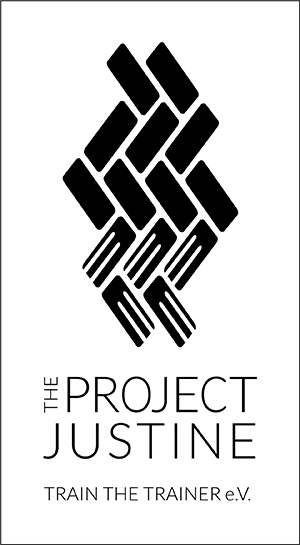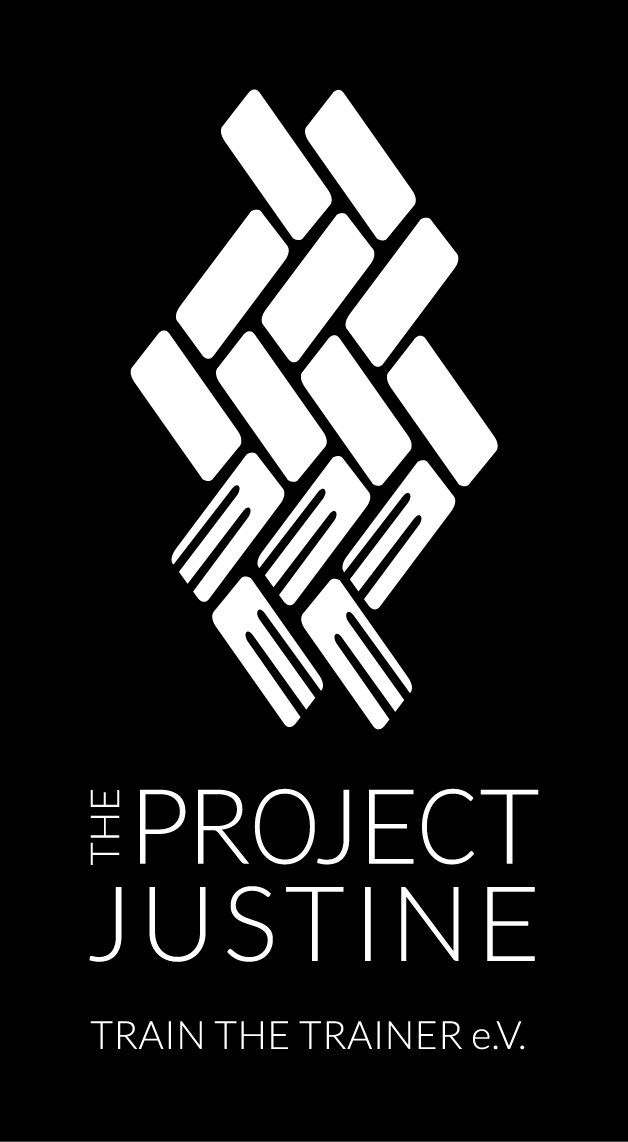Revised articles of association of the association in the version dated 15 November 2022
THE PROJECT JUSTINE – train the trainer e.V.
§ 1 Name and registered office of the Association, financial year
1. The name of the association is “The project Justine – Train the Trainer”. It is to be entered in the register of associations and will then bear the addition “e.V.”.
2. The association has its registered office in Munich.
3. The financial year is the calendar year; the first year 2016 is a short financial year.
§ 2 Purpose of the Association
1. The association “The project Justine – Train the Trainer e.V.” pursues exclusively and directly charitable purposes within the meaning of the section “Tax-privileged purposes” of the German Tax Code. It is selflessly active and does not primarily pursue its own economic purposes.
2. The purpose of the organisation is the promotion of education and training (§ 52 para. 2 no. 7 AO) as well as development cooperation with people in developing countries and refugees in Europe.
The purpose of the statutes is realised in particular through the provision of further vocational education and training, but also through intensive internships in suitable facilities. Insight into and training in production and process workflows in the western world is provided. This is practised in Africa, but also here in Germany.
This will enable the people supported in this way to build an independent, self-determined life for themselves. Particular attention is paid to ensuring that the people receiving support pass on the knowledge they have acquired with the help of the organisation and subsequently act as multipliers to help other people to undergo training, further training or advanced training (“train the trainer”).
Teaching facilities are set up on site for training or further education and are permanently supervised by the organisation. The association also works on a contractual or voluntary basis with suitable local people who, due to their training or other knowledge of a trade or service, are suitable to pass on their knowledge in these facilities.
3. The Association’s funds may only be used for the purposes set out in the Articles of Association. Subject to No. 4, the members of the Association shall not receive any benefits from the Association’s funds; this shall not apply to the reimbursement of necessary expenses for the fulfilment of assigned tasks. Members have no claims to the association’s assets when they leave the association
4. In principle, all club offices are held on an honorary basis.
Notwithstanding this, the General Meeting may decide to pay individual members of the entire Board of Directors an honorary allowance (Section 3 No. 26a EStG) or to employ them for administrative work as part of a mini-job. This applies in particular if they permanently or temporarily perform association activities that are usually subject to remuneration outside an association or that go beyond their office. The reasons must be stated in the resolution of the General Meeting.
Under no circumstances may a person be favoured by expenses that are alien to the purpose of the association or by inappropriately high remuneration.
§ 3 Membership
1. Any natural or legal person who supports the objectives of the Association may become a member of the Association.
2. The association has ordinary members, supporting members and honorary members. The founding members are ordinary members.
3. The Executive Board shall decide on the admission of a new ordinary or supporting member upon written application. Minors can only apply for membership through their legal representative.
At the proposal of the Board of Directors, the General Meeting may propose that a natural or legal person be granted honorary membership.
4. Ordinary and supporting members of the Association must pay an admission fee and regular membership fees; as a rule, these are to be paid in cash or in services of monetary value. The General Meeting shall determine the amount and due date of these amounts; it shall be free to set different admission fees or membership fees for different membership groups.
5. Resignation from the association is possible at any time with a notice period of eight weeks to the end of each year. It must be declared in writing to the Executive Board.
6. A member may be expelled from the Association if it
a) acts contrary to the objectives of the Association,
b) his or her behaviour is contrary to the interests of the association,
c) does not fulfil the obligations towards the association, or
d) is inactive over a longer period of time, in particular has failed to attend the General Meeting twice despite being invited without justification, or has repeatedly refused to take on reasonable activities in the interests of the Association’s purpose without sufficient justification; in these cases, the member must be informed in advance of the impending expulsion.
In all cases, the General Meeting decides on expulsion; this decision is final and cannot be contested.
e) Otherwise, membership ends with the death of natural persons and with the expiry of legal entities.
§ 4 Executive Board
1. The entire Executive Board consists of the First and Second Chairperson, the Chief Financial Officer and the Secretary. The General Meeting may appoint up to three assessors as additional members of the Board of Directors. If there are no candidates for individual positions on the full Board of Directors, any of the remaining members can also take on a vacant position.
2. The Executive Board within the meaning of § 26 BGB consists of the First Chairman and the Second Chairman. Each of them is authorised to represent the association alone.
3. The General Meeting elects the Executive Board for a period of two years from among the ordinary members. A member may be re-elected to the Board of Directors by the General Meeting. If a member of the Board of Directors resigns or the ordinary membership of a member of the Board of Directors expires, a replacement member must be elected before the end of the two-year period. The Board of Directors remains in office until a new election is held.
4. Resolutions of the Executive Board are passed at meetings of the Executive Board, to which the First Chairman issues invitations at least once per quarter, stating the agenda; as a rule, a notice period of one week should be observed. § Section 5 no. 1 sentence 2 applies accordingly.
Notwithstanding the above, resolutions may also be passed outside of Board meetings in writing, by fax or by e-mail if all Board members expressly agree to this procedure.
5. Resolutions of the Executive Board are passed by a majority of the votes cast. In the event of a tie, the First Chairman has the casting vote or, in his absence, the Second Chairman.
A member of the Executive Board may only be represented in his absence by another member of the Executive Board with written authorisation.
A member is not entitled to vote if the resolution concerns the execution of a legal transaction with him or the initiation or settlement of a legal dispute between him and the association.
6. The resolutions of the Board of Directors shall be recorded in the minutes and signed by the First Chairman; it shall also be deemed to be signed if he sends them from his e-mail address known to the Association for information purposes.
§ 5 General Meeting
1. The ordinary general meeting takes place once a year. It can also be held virtually with digital conference programmes, provided that every member has the theoretical possibility of participating.
2. The Executive Board may convene an extraordinary general meeting at any time. It is obliged to do so if the interests of the Association so require or if at least a quarter of the members request a meeting in writing, stating the purpose and reasons. § Section 5 no. 1 sentence 2 applies accordingly.
3. Each General Meeting shall be convened by the Board of Directors in writing, by fax or e-mail, observing a notice period of one week and stating the agenda, to the last known address, fax number or e-mail address of the members. The Board of Directors may shorten the invitation period in cases of particular urgency.
4. The chairman of the meeting is the first chairman or, if he is unable to attend, the second chairman. If both are not present, the General Meeting elects a chairperson. The same applies to the secretary.
5. Every duly convened general meeting is quorate regardless of the number of members present.
6. Each member has one vote in the General Meeting; § 4 No. 5 paragraph 2 applies accordingly. Resolutions are passed by a simple majority of the valid votes cast; this also applies to motions for resolutions that are not included in the agenda. In deviation from the statutory regulation, a majority of two-thirds is required to amend the Articles of Association or the purpose of the Association, and a majority of four-fifths of the valid votes cast is required to dissolve the Association.
Amendments or additions to the Articles of Association proposed by the competent registration authority or the tax office are implemented by the Executive Board and do not require a resolution by the General Meeting. They must be communicated to the members at the latest with the next invitation to the General Meeting.
7. Minutes must be kept of the proceedings of the General Meeting and the resolutions passed. This must be signed by the secretary and the chairman of the meeting and made available to all ordinary members.
§ 6 Cash audit
1. The General Meeting may appoint a cash auditor from among its members for one or more financial years who is not a member of the full Board of Directors.
2. A cash auditor has the right at any time during the period of his appointment to check the Association’s cash and bookkeeping for accounting correctness; the right to audit expressly does not extend to the appropriateness of individual measures or their compatibility with the purpose of the Articles of Association. It must report on the results of its audits to the next General Meeting.
§ 7 Dissolution of the association, termination for other reasons, discontinuation of tax-privileged purposes
1. In the event of the dissolution of the Association or the discontinuation of tax-privileged purposes, the remaining assets of the Association shall be transferred to the Stiftung Kinderfonds, Munich, which shall use them directly and exclusively for charitable purposes.
2. The same applies if the legal capacity of the association is withdrawn.
3. The First and Second Chairmen of the Executive Board are jointly authorised liquidators, unless the General Meeting appoints other members of the Association and they accept the office.

THE PROJECT JUSTINE
- train the trainer e.V.
Agricolaplatz 7
80687 Munich
THE PROJECT JUSTINE - train the trainer e.V.
IBAN DE71 4306 0967 8237 2376 00
BIC GENODEM1GLS
© THE PROJECT JUSTINE – train the trainer e.V.

